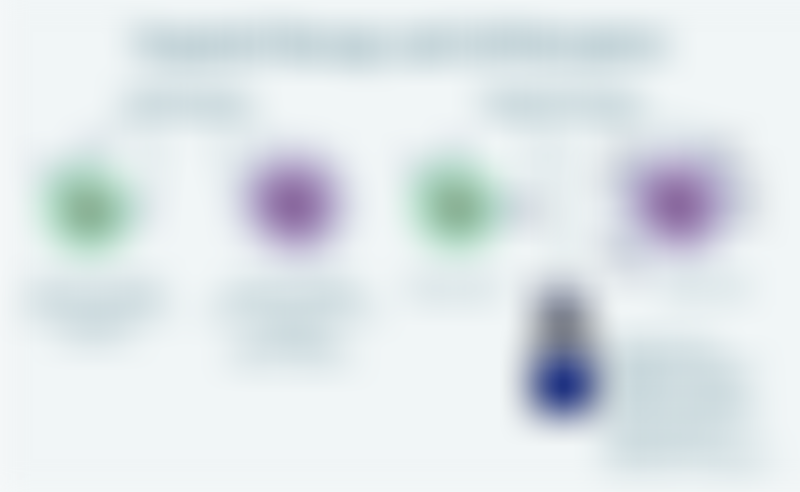Targeted Drug Therapy for HER2-positive Breast Cancer

Source: Shutterstock
If you have been diagnosed with HER2-positive breast cancer, know that targeted drug therapy is a viable option for treatment. Rather than feeling overwhelmed, understanding how the therapy is administered and its potential side effects can help ease any concerns. You can mentally prepare for this type of treatment and feel confident in your journey toward recovery.
What is targeted drug therapy?
Targeted drug therapy is a type of cancer treatment that uses drugs to specifically target and attack cancer cells while minimizing damage to healthy cells. Targeted therapies are often used in combination with other cancer treatments, such as chemotherapy and radiation therapy.
How does it work?
Targeted drug therapy works by specifically targeting certain molecules or proteins present in or on cancer cells that play a role in their growth and survival. By blocking or inhibiting these molecules or proteins, the targeted drug can interfere with the cancer cells' ability to grow and divide, slowing their growth or destroying them. 15% to 20% of breast cancers have cancer cells that produce an excessive growth-promoting protein called human epidermal growth factor receptor 2 (HER2). This type of breast cancer is known as HER2-positive breast cancer. Targeted drug therapy for HER2-positive breast cancer works by targeting the HER2 protein to slow down the growth of cancer cells. Due to how they work, these drugs are only effective for breast cancers that are HER2-positive.

How targeted therapy works. Adapted from: Shutterstock
Like chemotherapy drugs, targeted drugs travel in the bloodstream and can reach almost anywhere in the body, allowing them to target cancer that has spread to distant parts of the body. However, unlike traditional chemotherapy drugs, which can also harm healthy cells, targeted drugs are designed to target cancer cells and minimize damage to healthy cells selectively. This can result in fewer side effects and potentially better outcomes for patients.
Researchers often use genomic profiling and other advanced techniques to analyze the DNA, RNA, and proteins present in cancer cells to identify the specific molecules or proteins that are good targets for therapy. Once a suitable target has been identified, researchers can design and develop drugs that specifically target that molecule or protein and test them in clinical trials to determine their effectiveness and safety.
Types of targeted drug therapy for HER2-positive breast cancer
Different types of targeted drug therapies use different mechanisms to hinder the growth of breast cancer cells.
Monoclonal antibodies
These are man-made antibodies that bind to the HER2 protein on the surface of cancer cells, blocking its signals and slowing down the growth and spread of cancer. Common monoclonal antibody drugs used include trastuzumab, pertuzumab, and margetuximab. Sometimes, a combination of drugs may be given. These are normally given through a vein through an IV line. Sometimes, a combination of drugs may be injected under the skin.
Antibody-drug conjugates
These drugs combine a monoclonal antibody with a chemotherapy drug that can kill cancer cells. The antibody delivers the chemotherapy drug specifically to the cancer cells by attaching to the HER2 protein, reducing the toxicity to healthy cells. Commonly used antibody-drug conjugates include ado-trastuzumab emtansine and fam-trastuzumab deruxtecan. These are normally given through a vein through an IV line.
Kinase inhibitors
HER2 is a protein called kinase that signals cells to grow. Kinase inhibitors (KIs) are drugs that block these signals and prevent cell growth and survival. Lapatinib, neratinib, and tucatinib are commonly used KIs that can be taken as pills on a scheduled basis.
Side effects of targeted drug therapy
As with all cancer treatments, targeted drug therapy can have some side effects. These can vary depending on the specific drug used, the individual patient, and other factors such as cancer stage, age, and overall health. However, some common side effects of targeted drug therapy for breast cancer include:
- Infusion reactions
Many HER2-targeted antibodies are administered through intravenous infusions and can cause infusion reactions like fever, chills, nausea, and vomiting. However, these reactions can be effectively managed by adjusting the infusion rate or taking medication.
- Cardiac toxicity
Some targeted drugs can affect the heart and cause problems such as heart failure or abnormal heart rhythms. Patients who are taking HER2-targeted antibodies or HER2 kinase inhibitors may require regular cardiac monitoring to detect and manage any potential cardiac toxicity. Generally, these side effects improve upon discontinuation of the medication. Patients who are older, overweight or obese, have pre-existing heart conditions or are taking medication for high blood pressure may have an increased risk of heart failure while taking these drugs.
- Severe diarrhea
HER2-targeted antibodies and other targeted drugs can cause diarrhea, which medications can manage.
- Skin problems
Some targeted drugs can cause a rash or other skin reactions, which may require topical or systemic treatment.
- Fatigue
Fatigue is a common side effect of many cancer treatments, including targeted drug therapy.
- Liver toxicity
Some targeted drugs can affect the liver, causing abnormal liver function or damage. Your doctor will do blood tests to check and monitor your liver function during treatment. However, if you notice symptoms of liver failure, such as itchy skin, yellowing of the skin or the whites of your eyes, dark urine, or pain in the right upper belly area, inform your doctor right away.
When you are going through targeted drug therapy, it is crucial for you to have open and honest conversations with their healthcare team about any potential side effects you may experience. Especially if any new or worsening symptoms appear. It is important to know that most side effects can be managed effectively with medication or supportive care, so there is no need to be overly worried.
Overcoming the fear of medication
Although the idea of taking medication for breast cancer treatment may seem intimidating due to potential side effects, it is important to stay positive and persevere. Your healthcare team is there to support you every step of the way, so do not hesitate to keep in touch with them and ask for reassurance whenever needed. Do not feel alone in this journey, with the right care and support, your journey will get easier.